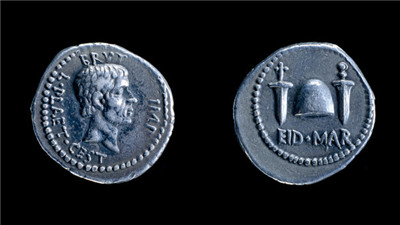(单词翻译:单击)
Among the most poignant objects that survive from the era of the Ides of March — March 15, 44 B.C., the day Julius Caesar fell to the knives of Brutus, Cassius and perhaps 21 other senators — is a dime-size silver denarius, minted by Brutus a year or two after the murder. One side of this rare coin shows military-style daggers flanking a felt pileus cap, a symbol of freedom from slavery, and the abbreviation EID MAR. On the other side, remarkably, Brutus had his own portrait stamped. Before this, Caesar was the only Roman who had dared put himself on a coin, for to do so was to assume the stature of a monarch — or a god.
公元前44年3月15日,尤利乌斯·恺撒(Julius Caesar)死在布鲁图(Brutus)、卡西乌斯(Cassius)以及另外约21位元老刀下。在那个时代最令人辛酸的遗物中,有一枚一角硬币大小的银币,是在刺杀事件一两年后由布鲁图斯下令铸造的。这枚罕见的银币一面正中是一顶无边毡便帽,象征摆脱奴隶制度,便帽两侧是两把军用匕首,下方是EID MAR这个缩写,意为3月15日。值得注意的是,在银币的另一面,布鲁图刻上了自己的头像。在此之前,恺撒是唯一一个敢把自己的头像刻在银币上的罗马人,这样做是为了体现君主(或神)的崇高地位。

How can we understand Brutus, a man who, so soon after stabbing Caesar in the name of stopping tyranny, had so reconciled himself to the ways of tyrants? Shakespeare, in the closing lines of “Julius Caesar,” eulogized Brutus (through the words of his foe, Marc Antony) as “the noblest Roman of them all” — the only conspirator moved by love of the Republic rather than envy of Caesar’s power. Dante, by contrast, in the final canto of “Inferno,” condemned Brutus to be forever chewed by Satan in the lowest circle of hell, alongside Cassius, his accomplice in the sin of betrayal, and Judas Iscariot.
我们怎么可能理解布鲁图呢?他以阻止专制之名刺死恺撒,之后不久,他自己也开始实行专制。莎士比亚(Shakespeare)在《尤利乌斯·恺撒》(Julius Caesar)的尾声,借布鲁图的敌人马克·安东尼(Marc Antony)之口,称赞布鲁图是“最高尚的罗马人”——唯一一个出于对共和国的热爱,而非觊觎恺撒权力而谋反的人。但是,但丁(Dante)在《地狱》(Inferno)的最后一篇中谴责布鲁图,判他在地狱的最底层永远被撒旦嚼食,和他同在地狱底层的是谋反罪同犯卡西乌斯以及叛徒犹大(Judas Iscariot)。
Dramatists and poets have done better than historians in portraying Brutus and his fellow conspirators. With the freedom to invent speeches, dialogue or even (as in the case of HBO’s series “Rome”) whole plot lines, they can give access to the minds of these men where our surviving ancient sources, with rare exceptions, cannot. The opacity of Caesar’s killers has bedeviled scholars, and it poses challenges for Barry Strauss in “The Death of Caesar.” Covering a time span of only three years — from the year before the Ides to the Battle of Philippi two years after, where Brutus, defeated by pro-Caesar forces, took his own life — this historical study captures the tension of an unfolding crisis but also runs into strong headwinds when it comes to questions of character and motive.
剧作家和诗人对布鲁图及其同伙的描绘胜于史学家。他们可以自由编写演讲、对话,甚至整个情节线索(例如HBO电视剧《罗马》[Rome]),可以进入这些人的思想,那是现存的古代史料几乎不可能做到的。恺撒刺杀者们的模糊性一直令学者们苦恼,也给巴里·斯特劳斯(Barry Strauss)撰写《恺撒之死》(The Death of Caesar)带来挑战。这本历史研究书籍的时间跨度只有三年,从恺撒死前一年到死后两年的菲利皮之战(Battle of Philippi)。布鲁图在菲利皮之战中被恺撒支持者的军队打败,自杀身亡。这本书生动描绘了一场逐渐揭开的危机,捕捉到紧张的气氛,而且正面回应了人物性格和动机等棘手问题。
Brutus, in particular, emerges as a blur. He has a long list of reasons for wanting Caesar dead, some admirable, others selfish. Strauss, a professor of history and classics at Cornell, explains these well but gives no sense of their relative weight; he seems uncertain how, in the end, to assess this crucial figure. “Brutus believed in ideals that were bigger than himself — in philosophy, in the Republic, and in his family,” Strauss writes, endorsing Shakespeare’s “noblest Roman” view. But he turns Dantesque in the very next sentence: “And so, once again, Brutus betrayed an older man who trusted him, just as he had earlier betrayed first Pompey and then Cato.”
特别是布鲁图,他的形象很模糊。他想杀死恺撒的原因很多,有些令人钦佩,有些是出于私心。斯特劳斯是康奈尔大学的历史和古典学教授,他很好地解释了这些原因,但是没有说清孰轻孰重。他似乎不确定最后该如何评价这个关键人物。“布鲁图信奉比他自己更重要的理想——哲学、共和国和家庭,”斯特劳斯这样写道,这似乎是在支持莎士比亚的“最高尚的罗马人”的观点。但是就在下一句话中,他转向了但丁:“所以,布鲁图再次背叛了一位信任他的长者,就像他之前背叛庞培(Pompey)和加图(Cato)那样。”
To some degree this blurriness is inevitable. Our sources for this era have many gaps and blind spots, and these difficulties grow as a historian’s time scale shrinks, much as a low-resolution photograph looks worse the more it is enlarged. But Strauss too often fills these gaps with multiple, even conflicting, possibilities; one wants him to take a stronger interpretive hand. It’s hard to draw out the moral meaning of Caesar’s murder from among a welter of mights and perhapses.
从某种程度上讲,这样的模糊不可避免。那个时代的史料有很多空白和盲点,缩小时间跨度更是加大了难度,就像低像素照片越被放大,看起来就越糟。但是,斯特劳斯过于频繁地使用许多相互矛盾的可能性来填补这些空白。他的立场应该更明确。从一堆杂乱的可能性中,很难阐释恺撒刺杀案的道德意义。
“The Death of Caesar” is written in a jaunty style very different from that of other recent studies of Caesar’s times (and the past decade has seen many). “No Brutus, no assassination” is how Strauss formulates his central role in the murder plot; Caesar’s political network is said to be so vast that to record it “would take all the papyrus in Rome.” Folksiness in moderation is refreshing, but Strauss carries it too far, and it sometimes leads him into mixed metaphors or jarring anachronisms (Romans who are described as having “an ace up their sleeve,” when in fact they knew nothing of either playing cards or sleeves).
《恺撒之死》笔调欢快,与近些年对恺撒时代的其他研究(过去十年中我们看到了很多这样的研究)大相径庭。“没有布鲁图,就没有刺杀案”——斯特劳斯是这样确立布鲁图在刺杀中的中心地位的。据说恺撒的政治网络非常庞大,把它完全记录下来“会用尽罗马所有的纸莎草”。适度随意会让人觉得清新,但是斯特劳斯太过随意了,有时会导致隐喻的混乱,或不和谐的时代错误(书中说罗马人“袖中藏有王牌”[an ace up their sleeve],实际上当时的罗马人既不打牌,衣服也没有袖子)。
Strauss made his mark as a military historian in books like “The Battle of Salamis” and “The Spartacus War,” and he’s strongest here when tracking Caesar’s army units in the days after the assassination. In contrast to the ancient sources, which tend to ignore nameless legionaries in favor of great leaders, Strauss foregrounds the role played by Caesar’s hardened veterans. Their opposition, he suggests, blocked the conspirators from restoring the supremacy of the Senate, their principal goal. Those who had marched under Caesar’s banners wanted an imperator, a conquering general, to guide the state. Octavian, later Augustus, ultimately became the first in a long line of autocrats who ruled by grace of army support.
斯特劳斯凭借《萨拉米斯之战》(The Battle of Salamis)和《斯巴达克思起义》(The Spartacus War)确立了军事史学家的名声。在《恺撒之死》中,他写得最好的是恺撒遇刺后的军队组织。古代史料往往忽视无名的军团士兵,青睐伟大的领袖,斯特劳斯则突出描述了坚定的恺撒老兵们的作用。他说,由于这些人的反对,谋反者没有实现最主要的目标——恢复元老院的至高地位。那些在恺撒旗帜下前进的人想让一位绝对统治者——一个能征善战的将军——来领导国家。屋大维(Octavian),也就是后来的奥古斯都(Augustus),最终成为那一长串依靠军队支持进行统治的独裁者中的第一位。
Strauss also takes special interest in the most soldierly of the conspirators, a top army officer named Decimus. Slighted by Greco-Roman historians and all but ignored by Shakespeare (who also misspelled his name), Decimus actually played a leading role in the Ides conspiracy, Strauss asserts. The decision of Decimus to join the murder plot is in its way more shocking, as portrayed by Strauss, than the similar choice made by Brutus. But Decimus is little more than a cipher in the ancient record. His prominence here thus leaves Strauss with yet more blank spaces and unanswerable questions.
斯特劳斯还对谋反者中最英勇的那一位特别感兴趣,他就是最高军官德西谟斯(Decimus)。希腊罗马史学家们对他轻描淡写,莎士比亚几乎完全忽视了他(把他的名字都拼错了),但是斯特劳斯认为,实际上他在恺撒刺杀案中起着主导作用。根据斯特劳斯的描述,从某种角度讲,德西谟斯决定参加刺杀比布鲁图斯做出类似的决定更令人震惊。但是在史料里,他只是个无足轻重的人。所以,他在《恺撒之死》一书中的重要地位给斯特劳斯留下了更多空白和无法回答的问题。


